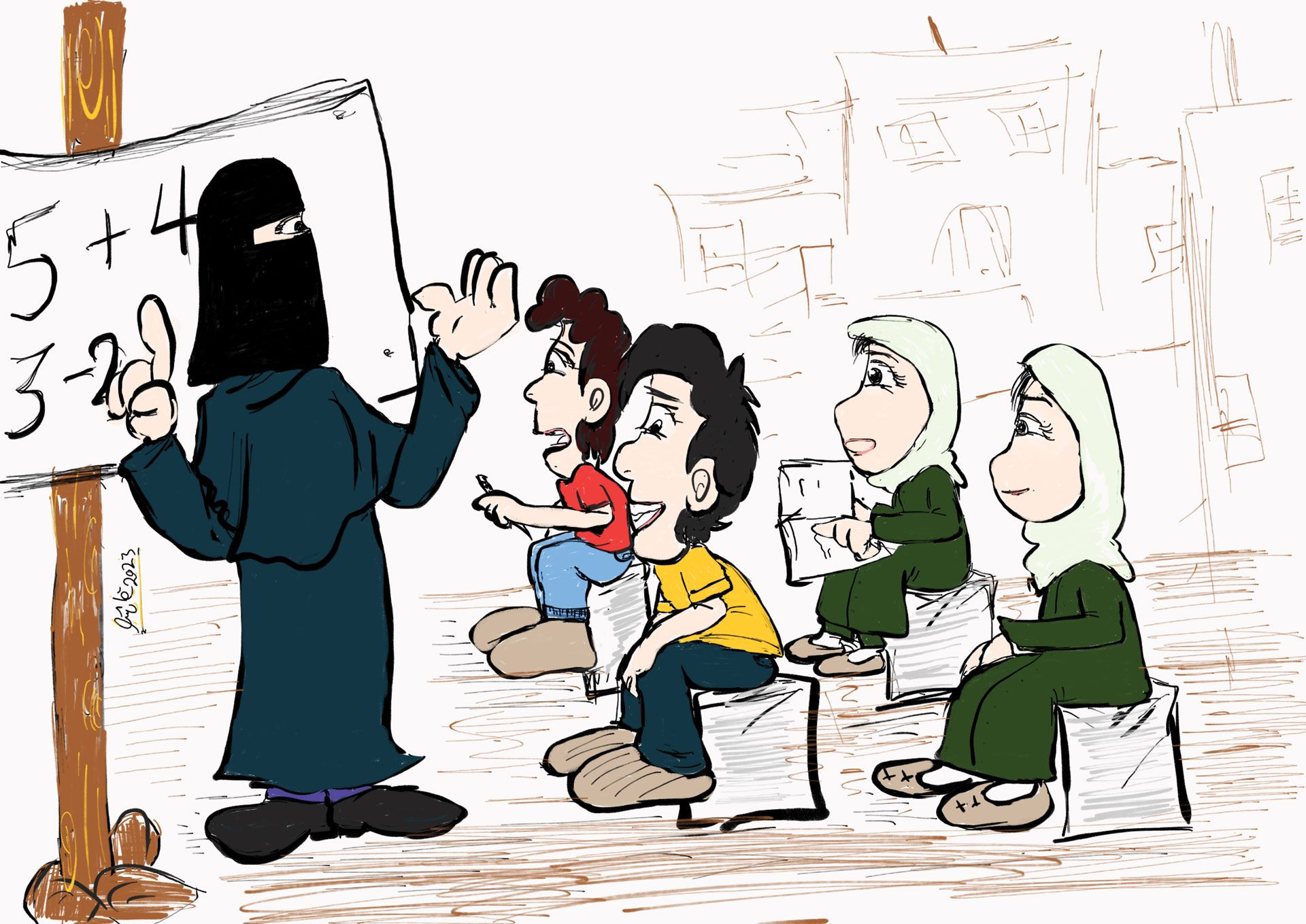In 2015, a conflict-scarred district in Nahm found its small beacon of hope in Um Mohammed, a 45-year-old educational leader and a mother of four.
Focused on rescuing her kin and village children from the jaws of a devastating war, Um Mohammed initially took eight children under her wing. This small haven, located in the heart of Sana'a, soon expanded to accommodate 20 young souls.
Her role wasn't merely that of a temporary guardian; she transformed into a mother figure for these displaced children, providing an encompassing care package that included food, healthcare, education, and emotional support. Driven by an innate sense of responsibility toward the next generation, Um Mohammed drew upon her maternal instincts and professional commitment to education.
I ensured they were formally
registered in schools.
..
Um Mohammed, unyielding in her pursuit to offer quality education, even made tough decisions to protect the children. "After an unfortunate incident of a teacher's misconduct, I felt compelled to transfer them to private institutions. Their emotional well-being is just as vital as their academic progression," she asserts.
Extending her care beyond academics, Um Mohammed embarked on a mission to heal the children emotionally. She initiated a simple yet profoundly impactful tree-planting activity. "Each child planted a tree, caring for it as one would a pet. The fruits of their labour were evident during harvest seasons, a time that brings unbounded joy to their young faces," she describes. "The almond and pomegranate trees they planted years ago continue to bear fruit, just as these children continue to thrive emotionally."
The Perilous Road to Reunification
In 2018, Um Mohammed undertook one of her most challenging missions—reuniting the children with their biological families. Despite logistical nightmares—closed roads, perilous routes, and hostile checkpoints—she was unwavering. "The risks were manifold, yet we embarked on a treacherous journey from Sana'a to the Nahm district. There was no turning back," she recalls.
Many Children grapple
with isolcation and depression
She faced stringent scrutiny at military checkpoints. "I was given the ultimatum to abandon two older children. We waited for seven hours until we were allowed to proceed," she states. She navigated a maze of bureaucratic red tape and security measures, but ultimately, her perseverance prevailed, uniting the families, albeit temporarily.
Fading Joys and Lingering Hopes
The joy of family reunification was ephemeral. With escalating conflict, many families were displaced yet again, facing an even darker chapter of their lives. "The children often tell me how much they long to return to the sanctuary I provided," she shares, her voice tinged with sadness. Only two, Yahya and Ammar, could make it back to her home.
Many Children grapple
with isolcation and depression
Um Mohammed speaks somberly about the condition of the children who now live in desperate circumstances. "Who can find a solution to their suffering? Who can restore their sense of security and stability?" She poses these questions, not expecting easy answers but determined to continue her mission. She vows never to abandon them, resolving to find a way to alleviate their suffering. Additionally, she plans to visit the children and their families in displacement camps, hopeful that an improvement in her financial situation will enable her to carry out this mission.
Um Mohammed notes that the children are struggling with heightened anxiety, missing the security they experienced under her care. "Many of them grapple with isolation and depression due to the hopelessness they feel over their present circumstances—especially given the hopeful future that I had been building for them through education and psychological support," she explains.
A Legacy and a Dream
'They who strive, find; and they who sow, reap.' That's the wisdom I was raised on," Um Mohammed recalls. Her father went to extraordinary lengths to educate her and her sister, defying societal norms that discouraged the education of rural girls. "To ensure we could attend secondary school in the district center, far from our village, my father plowed land for the owner of a car in exchange for our transportation," she says.
They who strive, find;
and they who sow, reap.
Um Mohammed's commitment to education and community development has been a lifetime endeavor. In 2008, after obtaining a degree in Biology Sciences, she designated a portion of her family home to eliminate illiteracy and promote education for girls, alongside her sister. This initiative was met with resistance initially, but her positive influence gradually led the community to embrace the education of girls. Over the years, she has empowered women and girls through various training programs in crafts like sewing, knitting, embroidery, leather tanning, and even agricultural skills.
Reflecting on her journey, Um Mohammed laments the damage war has inflicted upon her family home and her various projects aimed at the empowerment of women in the Nahm district. "Legal measures must be taken to stop this vandalism," she urges, advocating for the formation of a mediation committee to protect properties and development initiatives.
Um Mohammed firmly believes that women have the power to bring peace and stability. "Women are capable of leading in times of war and peace alike," she says. "As mothers, we have the influence to instill the values of peace and respect in our children, forbidding them from engaging in destructive acts, whether against a tree or a stone."
As for her future, Um Mohammed dreams of a safer and more stable world for the children under her care. She aims to return to farming abandoned lands in her native Nahm district, aspiring for economic empowerment akin to past times. "What holds me back is a lack of sufficient support to complete this development project," she concedes.